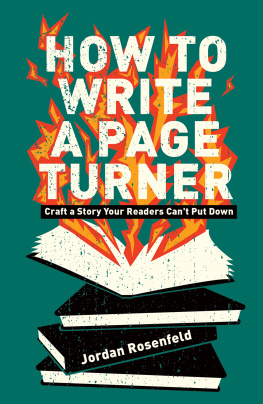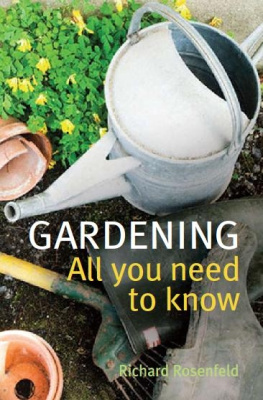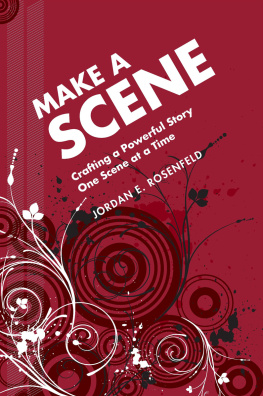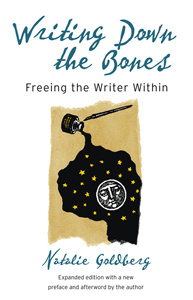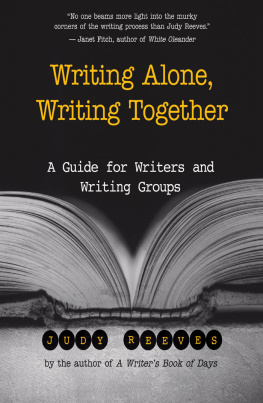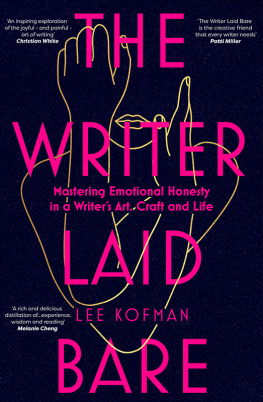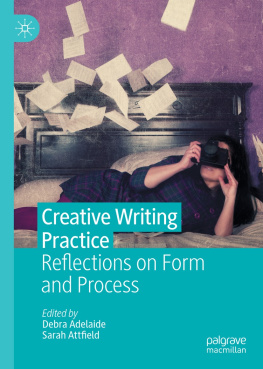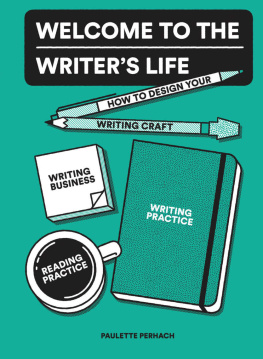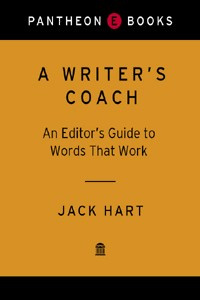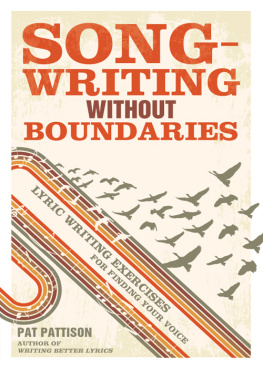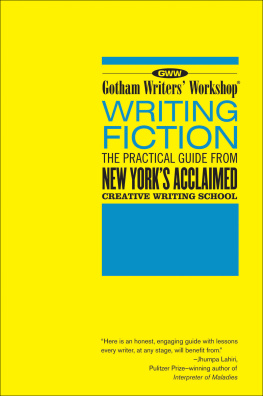Contents
Guide
A Writers Guide to
PERSISTENCE
How to Create a Lasting and Productive Writing Practice
JORDAN ROSENFELD
Table of
CONTENTS
chapter 1:
LOVE THE JOURNEY
chapter 2:
CREATE A PRACTICE
chapter 3:
AWAKEN YOUR AUTHENTICITY
chapter 4:
TAME TIME
chapter 5:
FIND BALANCE, BE PRODUCTIVE
chapter 6:
BUILD BOUNDARIES
chapter 7:
SEEK TO SERVE
chapter 8:
GO WHERE YOU ARE WELCOME
chapter 9:
PUSH THROUGH PERFECTIONISM
chapter 10:
BREAK THE BLOCKS TO CREATIVE FLOW
chapter 11:
BE BOLD, WRITE BRAVELY
chapter 12:
INCREASE YOUR CRAFT
chapter 13:
STRETCH YOUR SKILLS
chapter 14:
RELISH REVISION
chapter 15:
CONSIDER NO EFFORT WASTED
chapter 16:
COMBAT CRITICISM, SEEK CRITIQUE
chapter 17:
STAVE OFF SABOTAGE
chapter 18:
ALLEVIATE ENVY
chapter 19:
BE RESILIENT AFTER REJECTION
chapter 20:
FIGHT THE FUNNEL EFFECT
chapter 21:
TROUNCE TABOO
chapter 22:
NOURISH YOURSELF TO AVOID BURNOUT
chapter 23:
GO IT ALONE: WHEN TO SELF-PUBLISH AND PURSUE YOUR UNIQUE VISION
chapter 24:
WRITE OUTSIDE THE BOX
chapter 25:
SUBMIT STRONG
INTRODUCTION
Some writers persist at the craft of writingthey succeed at publishing, finding an audience, even making a living from their words. But many more do not. Is a penchant for success just something youre born with, like good genes or brown hair? Not at all. Persistence is the key factor, the dividing line, between writers who succeed and writers who merely wish to. It comes not from mental acuity or superstrength but from finding the deep meaning and joy at the root of your writing practice and calling on this joy to get you through the challenges. If you believe in what youre writing, take pleasure in the act of doing so, learn to keep working when its hard, and put in place a range of strategies to weather the rough patches, you are that much more likely to persistand thus to succeed.
In my years as a freelance journalist and radio host, during which I interviewed hundreds of writers, I cant tell you how many times I heard the phrase, I am not as successful as I would like to be. This came from not only emerging writers but from New York Times best-selling authors as well. How can this be? The fear of not being successful enough is conjured from the egos dauntless quest for more, for better, for whatever is over there. To the ego, happiness exists outside of the self, and therefore, so does success. Im here to reassure you that you can be happy with your writing practice right now, in this moment, if you choose to be. Moreover, taking this attitude and the practices recommended in this book will prepare the ground for your writing success. Thus when you do snag that publishing deal or grow your audience into a vibrant community of eager readers, you wont find yourself empty, discouraged, or wishing for a different kind of success.
A Writers Guide to Persistence is a tool kit to support you through the unique challenges of the literary art so that you can create a sustainable, long-term writing practice without being swayed by the constant changes, negative criticism, and doubts that come with the territory.
This books aims to help you feel comforted, supported, and less alone, and also offers practical tricks to free you from detrimental habits. It aims to get you back on your feet after a variety of crises and common writer calamities so that you can do the important writing you are meant to do and nourish your writers spirit. If you are called to write, you must take it seriously, and this book can help you do just that.
This book was inspired by the many, many talented writers I know, published in myriad ways: by their own hands, through a small press, or with a big publisher. They are all human, full of fears and doubts just like the rest of us, but also motivated, persistent, and hardworkingqualities that count toward cultivating success.
The concept of success has been co-opted by the flash-bang spirit of that tiny percent of writers who achieve rock star, billionaire status. Its been twisted to be synonymous with fame, fortune, and world renown. While I cant argue that those conditions do add up to success, there are many, many other factors that dont have anything to do with the approval of another person (or publication) but that lead to fulfillment as a writer. As long as you focus on an outcome you have no control over, you will come to your writing with conflicted feelings that range from frustration to despair. And focusing on what you cant control will hamper your ability not only to reach for those larger goals of success but also to do the very thing you came here to do: sit down and write.
There is a fine line between the creation of art for its own sake and sharing that art with an audience. We live in a culture that says fame and fortune await anyone willing to work hard enough. But not everyone will be J.K. Rowling or Stephen King. Once you surrender to this truth, you can see what is on the other side of fame and fortune; i.e., all the worthy reasons you started writing in the first place, including joy, purpose, expression, connection, discovery, journeying, catharsis, and having a deep, rich, and meaningful writing practice.
If this book can do anything for you, it can remind you that no situation is bad enough that it deserves to steal your joy or right to write. This book is a refuge for dealing with the challenges and woes that all writers face. It helps you focus instead on making your arton writingwhich then gives you something important to share with an audience. By coming from a joyful place of authenticity and doing consistent work, your writing will stand a chance of rising above to reach many others. Read the chapters in order, or choose those chapters that speak to your particular challenges.
Above all, be persistent.
JORDAN E. ROSENFELD
Part One
PRACTICE
chapter 1
LOVE THE JOURNEY
Making the work you want to make means finding nourishment within the work itself.
DAVID BAYLES AND TED ORLAND, FROM ART & FEAR: OBSERVATIONS ON THE PERILS (AND REWARDS) OF ARTMAKING
Do you remember a time when you felt like words ran in your veins instead of blood; when ideas that were knocking around in your head crystallized on a crisp, white journal page; when you couldnt wait for a few minutes alone to jot down a molten thought youd held onto all day at work? At some point in your journey as a writer, you have likely experienced the exhilaration, satisfaction, relief, release, and joy of being a wordsmith and have hungered for more.
While each of us writes for different reasons, most of the writers Ive known share one thing in common: Writing is an integral part of their lives. For some, its even their lifes purpose. For others, its an important or necessary part of expressing themselves, connecting with others, and making meaning. Writing is an art, but I like to refer to it as a craftwhich holds the possibility for improvement and change. Writing allows you to delve deep into yourself and to connect with your fellow humans in a very powerful way, which often leads to new corridors of knowledge and understanding.


